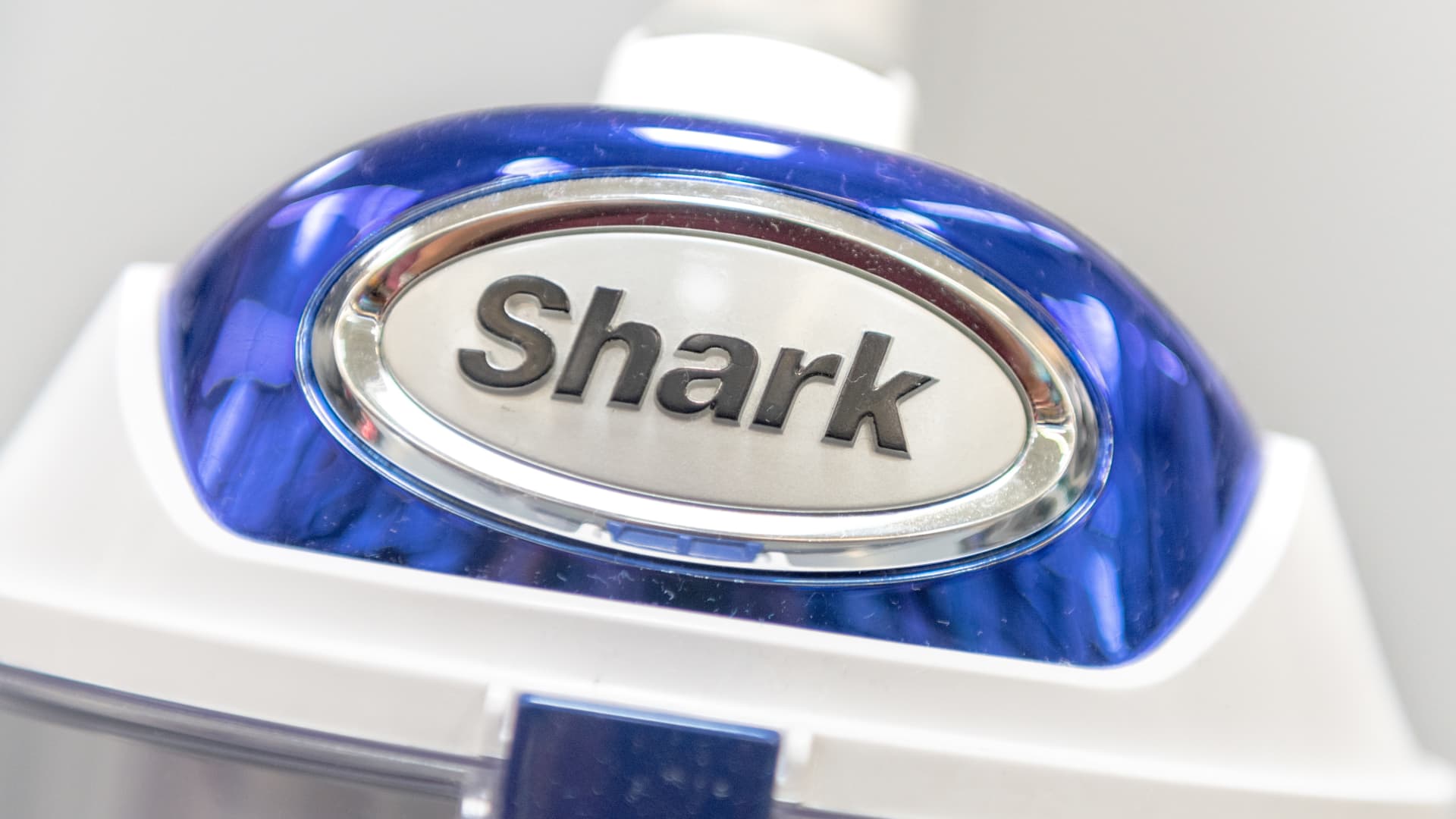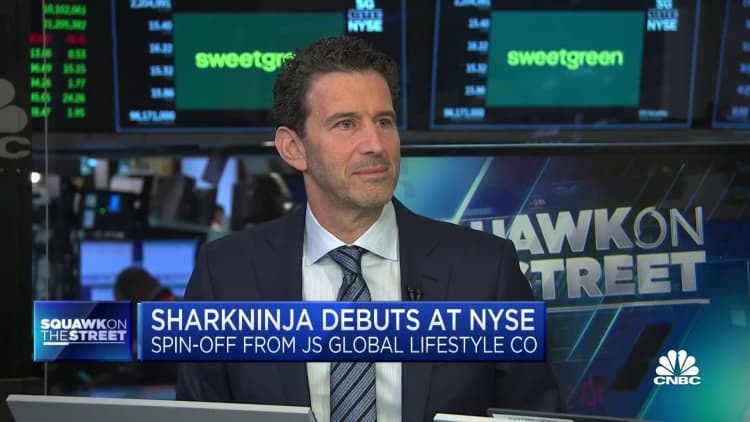

A blue and white Shark Vacuum on a store display. Shark is one of several house-care brands developed by SharkNinja Operating LLC.
Roberto Machado Noa | Lightrocket | Getty Images
In a year that’s featured very few IPOs, home appliance and vacuum cleaner company SharkNinja debuted on the New York Stock Exchange on Monday, after it was spun off from Hong Kong’s JS Global Lifestyle.
After its listing at just over $30 a share, the stock — trading under ticker symbol SN — rocketed 40% in its first day. But in the four that followed, SharkNinja shares tumbled below their listing price to $26.90 at Friday’s close.
CEO Mark Barrocas described the company in an interview with CNBC on Monday as a “consumer-solving engine.” He said, “we solve problems that others can’t.”
But regardless of how popular the company’s smart vacuums, air fryers and grills may be, the stock’s lackluster performance in its first week points to other problems for investors to consider. Most notably, SharkNinja and other companies that are closely tied to China have to deal with mounting geopolitical tensions between the world’s two largest economies and the exorbitant costs of navigating a strained trade relationship.
As a business, SharkNinja has established itself in the U.S. The company generated revenue last year of $3.7 billion, about flat compared to the prior year but up 35% from 2020, according to a regulatory filing. In the latest reported quarter, 70% of its revenue was in North America.
Shark’s upright vacuums and Ninja’s electric grills each account for 43% of their respective markets in the U.S., the filing showed. From 2019 to 2022, Shark’s robot vacuum market share grew from 15% to 25%.
Meanwhile, vacuum rival iRobot, which Amazon has agreed to acquire, is giving up business. The company said in the risk factors section of its most recent annual filing that “increased competitive pressure has resulted and will continue to result in a loss of sales or market share.” In June, the U.K.’s competition watchdog greenlit Amazon’s planned $1.7 billion purchase of iRobot, which was agreed upon a year ago.
SharkNinja’s gains don’t tell the whole story.
Headquartered in the Boston suburb of Needham, Massachusetts, SharkNinja was a subsidiary of private equity firm JS Global, which is majority owned by its chairman, Xuning Wang, a Chinese citizen based in Hong Kong. JS Global separated the U.S. and China businesses, citing “geographic-specific considerations.”
SharkNinja’s finances remain closely tied to China.
Since 2020, the company has paid out over $3.3 billion to JS Global subsidiaries to obtain the merchandise and goods, mostly made in China, that it sells to American consumers, and to provide “certain procurement and quality control services.” That arrangement will keep going even with SharkNinja’s independence.
“We intend to continue to rely on JS Global for certain supply chain services,” the filing said.
SharkNinja said it paid out a $375 million “special cash dividend” to JS Global for the repayment of debt. Two more dividends, in February 2023, paid out an additional $115.4 million to the firm.
Then there’s the tariff risk. SharkNinja was granted a tariff exemption, which applies to certain goods sent from China to U.S. consumers. That exemption may not necessarily be extended to SharkNinja again, the company warned, creating a “a substantial increase in costs.”
In competing for U.S. customers with brands like Breville and iRobot, SharkNinja has focused heavily on marketing. It’s also run afoul of U.S. intellectual property rules. In March, the International Trade Commission ruled in favor of iRobot, after the company alleged SharkNinja infringed on one of its patents.
In its investor pitch deck, SharkNinja touted its product design and technology teams, which it says are spread across the world, including in China. But volatile China-U.S. relations create uncertainty as to whether that’s an ongoing advantage.
“There are no existing long-term manufacturing contracts on which we are substantially dependent and most of our products are dual-sourced,” a SharkNinja spokesperson told CNBC. “This diversification allows our supply chain to remain highly competitive and adaptive to evolving market and economic conditions.”
With respect to intellectual property issues, the spokesperson said, “we have the utmost respect for IP.”
National security and regulatory concerns are also a risk.
The Senate last month overwhelmingly backed legislation that would require U.S. firms to notify the Treasury when investing in advanced Chinese technology, and President Joe Biden has long been expected to issue an executive order that would restrict U.S. investment in high-end Chinese tech. Robot vacuums have particular privacy risks that could be of concern.
At the same time, the Federal Trade Commission has shown its interest in the space, as it’s scrutinizing the Amazon-iRobot deal on concerns about market power.
SharkNinja’s frosty reception by public investors could be as much about the state of the tech capital markets as about China concerns. Since IPOs reached record levels in 2021, the market has virtually frozen, particularly in tech, which hasn’t seen a notable venture-backed deal since HashiCorp near the end of 2021.
In total, just 63 companies had U.S. IPOs in the first half of 2023, according to Ernst and Young data. For the full year of 2021, that number was 416. SharkNinja didn’t have a traditional IPO with fresh capital, as it was spun off and began trading as a separate entity.
— CNBC’s Jordan Novet contributed to this report.





